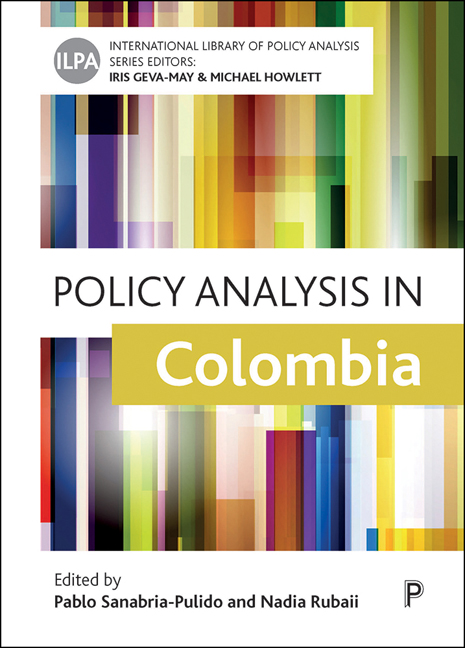Book contents
- Frontmatter
- Dedication
- Contents
- List of Figures and Tables
- List of Abbreviations
- Notes on Contributors
- Editors’ Introduction to the Series
- Policy Analysis in Colombia: An Introduction
- Part One Policy Analysis in Contemporary Colombia
- One The policy Analysis Movement in Colombia: The State of the Art
- Two Evolution of Policy Analysis as a Field of Study and Instruction in Colombia
- Three Policy Analysis, Bureaucratic Capacity and Public Administration Reforms in Colombia
- Part Two Policy Analysis within National and Subnational Governments
- Four Policy Analysis Inside Central Government in Colombia
- Five Policy Analysis and the Legislature in Colombia
- Six Policy Analysis in the Colombian Constitutional Court
- Seven Metropolitan Governance and Policy Analysis in Colombia
- Eight Policy Analysis for Decision Making in Colombian Local Governments
- Part Three Policy Analysis in Key Policy Domains
- Nine Policy Analysis in the Education Sector in Colombia
- Ten Policy Analysis in the Health Sector in Colombia
- Eleven Policy Analysis and Decision Making in the Military Forces: The Havana Experience
- Twelve Technocracy, Decision Making and Economic Policy in Colombia
- Thirteen Social Policy, Target Populations and Policy Analysis in Colombia
- Part Four Policy Analysis Beyond the State
- Fourteen Political Parties and Policy Analysis in Colombia
- Fifteen Policy Analysis and NGOs in Colombia
- Sixteen Media, Evidence and Policy Analysis in Colombia
- Conclusion: Building Capacity for Policy Analysis Amid Tensions and Challenges in Colombia
- Index
Six - Policy Analysis in the Colombian Constitutional Court
Published online by Cambridge University Press: 10 March 2021
- Frontmatter
- Dedication
- Contents
- List of Figures and Tables
- List of Abbreviations
- Notes on Contributors
- Editors’ Introduction to the Series
- Policy Analysis in Colombia: An Introduction
- Part One Policy Analysis in Contemporary Colombia
- One The policy Analysis Movement in Colombia: The State of the Art
- Two Evolution of Policy Analysis as a Field of Study and Instruction in Colombia
- Three Policy Analysis, Bureaucratic Capacity and Public Administration Reforms in Colombia
- Part Two Policy Analysis within National and Subnational Governments
- Four Policy Analysis Inside Central Government in Colombia
- Five Policy Analysis and the Legislature in Colombia
- Six Policy Analysis in the Colombian Constitutional Court
- Seven Metropolitan Governance and Policy Analysis in Colombia
- Eight Policy Analysis for Decision Making in Colombian Local Governments
- Part Three Policy Analysis in Key Policy Domains
- Nine Policy Analysis in the Education Sector in Colombia
- Ten Policy Analysis in the Health Sector in Colombia
- Eleven Policy Analysis and Decision Making in the Military Forces: The Havana Experience
- Twelve Technocracy, Decision Making and Economic Policy in Colombia
- Thirteen Social Policy, Target Populations and Policy Analysis in Colombia
- Part Four Policy Analysis Beyond the State
- Fourteen Political Parties and Policy Analysis in Colombia
- Fifteen Policy Analysis and NGOs in Colombia
- Sixteen Media, Evidence and Policy Analysis in Colombia
- Conclusion: Building Capacity for Policy Analysis Amid Tensions and Challenges in Colombia
- Index
Summary
Introduction
Courts have increasingly become key players in the political arena and the policymaking process. Judicialization of politics, as this trend has been called (Vallinder, 1994), is the process by which issues that were traditionally in the realm of political bodies and decision makers, namely legislatures and the executive branch, are being increasingly decided in courts. Under certain conditions, in instances such as democratic settlings, demands for the protection of constitutional rights, and clashes between agencies and levels of government, judges have acquired a central role in the settlement of political disputes and the creation of new laws through the interpretation of existing constitutional provisions, whether by abstract review or by resolving concrete cases (Tate and Vallinder, 1995). The rise of a new constitutional order (Ackerman, 1997) has turned judicial tribunals into fora of political discussion, where different political agents, especially those traditionally excluded from traditional representative institutions, have found a place to advance their policy preferences (Epp, 1998; McCann, 2008).
Constitutional courts, in particular, have come to make, or increasingly dominate the making of public policies over several social issues, previously the remit of representative bodies or administrative agencies. One of the reasons that explains this change in the policy-making process, especially in Latin America, is the emergence of new institutional arrangements that have entailed the adoption of extensive rights catalogues and new legal mechanisms to enforce them. Legal claims “from below” (Sieder et al, 2005) regarding governmental policies have driven courts to analyze different public policies in order to establish whether or not governmental agencies have contributed to the neglect of individual and social rights, either by direct actions or by omissions in the design, implementation, monitoring and evaluation of those policies. In case of negligence or omission, judges become guides and creators of new public policy.
Due to this modern political phenomenon, the study of judicial politics is now a consolidated subdiscipline within political science, especially regarding the US and, to a lesser extent, the western European democracies.
- Type
- Chapter
- Information
- Policy Analysis in Colombia , pp. 99 - 112Publisher: Bristol University PressPrint publication year: 2020



